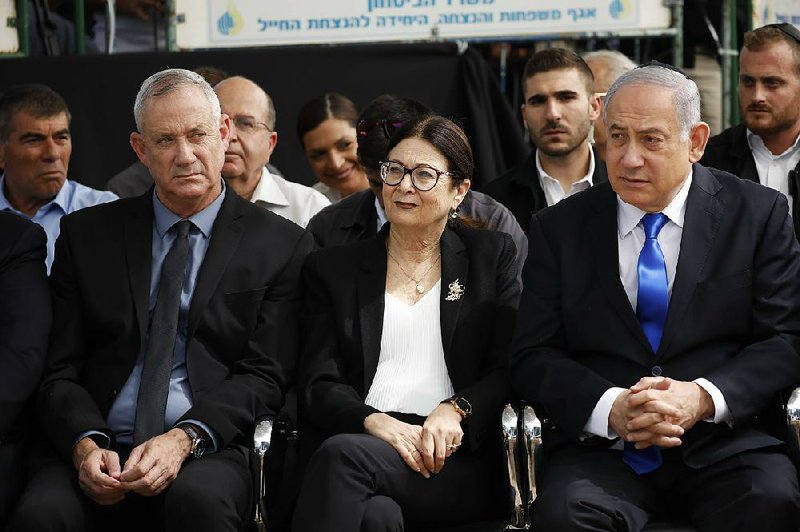JERUSALEM -- Israeli Prime Minister Benjamin Netanyahu, seeing his chances of an outright election victory slip away as final votes were counted, asked his chief rival on Thursday to negotiate a possible power-sharing agreement.
But Benny Gantz, head of the center-left Blue and White party, wasn't moved by an overture that came only after the late election results showed his lead widening. The former army chief of staff said he was open to forming a unity government as long as he was at the top of it.
"We will listen carefully to anyone, but we will not surrender to any dictates," Gantz said in his first public address since the election. He said he remained committed to pursuing "a broad and liberal coalition headed by myself."
With both men demanding to be prime minister, there were no signs they could break the deadlock, indicating the country could be headed for a long and contentious period of uncertainty. Politicians on both sides of the aisle warned of being forced into an unprecedented third election in less than a year.
"There is no choice but to form a broad unity government," Netanyahu said in a video statement. "We cannot and there is no reason to go to third elections."
After failing to form a coalition after April's election, Netanyahu called Tuesday's vote, only to see the country emerge with another political stalemate.
With nearly all votes counted Thursday, Gantz's centrist Blue and White party stood at 33 seats in the 120-seat parliament. Netanyahu's conservative Likud stood at 31 seats.
But neither party can muster a majority coalition of 61 seats with their smaller allies. The difference-maker appears to be Avigdor Lieberman, whose Yisrael Beitenu party captured eight seats. Lieberman has refused to commit to either side and is instead demanding a broad unity government with the two major parties.
Netanyahu's proposal was a nonstarter for Gantz. His Blue and White party has said it will sit with Likud only if Netanyahu steps aside to deal with his legal woes. Netanyahu is expected to be charged in a series of corruption cases in the coming months. Likud lawmakers remain loyal to Netanyahu and have given no signs of wanting to replace him.
Speaking to reporters, Gantz said that as the largest party, he should lead the next government.
"The people chose unity, the people want Israel to come before everything, and therefore, Blue and White under my leadership won the elections," said Gantz.
Yair Lapid, a senior Blue and White member, accused Netanyahu of dragging the country to a third election and called for him to step down.
"One person is preventing right now the establishment of a liberal unity government. One person stands between what is good for the country and what's good for that person. And country always comes first," he said.
Netanyahu repeated his offer at a memorial for the late Israeli leader Shimon Peres, where he and Gantz shook hands in their first public encounter since Tuesday's vote. He also offered to meet with Gantz.
Neither party appears able to form a majority government without the support of Lieberman, who heads a secular, ultranationalist party and refuses to sit with Netanyahu's ultra-Orthodox religious allies. At the same time, Lieberman is unlikely to sit with leftist Arab parties whose support Gantz would need to secure a majority.
Lieberman believes a broad, secular unity government with Likud and Blue and White is the only way out of the impasse.
The focus will shift next week to President Reuven Rivlin, who will begin consulting with all of the parties Sunday before he chooses a politician to form a government and be the next prime minister. Each party will recommend its choice for prime minister, after which Rivlin is to pick the politician who he thinks has the best chance of forming a stable coalition.
Rivlin said the consultations are expected to last two days. After that, he'll announce his pick.
The uncertainty has thrown Netanyahu's political future into question.
Israel's attorney general has recommended charging Netanyahu with bribery, breach of trust and fraud in three corruption cases. Netanyahu will be given an opportunity to defend himself at a hearing in early October, after which the attorney general will make a final decision.
Netanyahu had hoped to secure a narrow majority of hard-line and religious parties that support granting him immunity from prosecution.
Israeli law does not require a sitting premier to resign if indicted. But if he is charged, as is widely expected, he would come under heavy pressure to resign.
Information for this article was contributed by Ruth Eglash and Steve Hendrix of The Washington Post.
A Section on 09/20/2019
